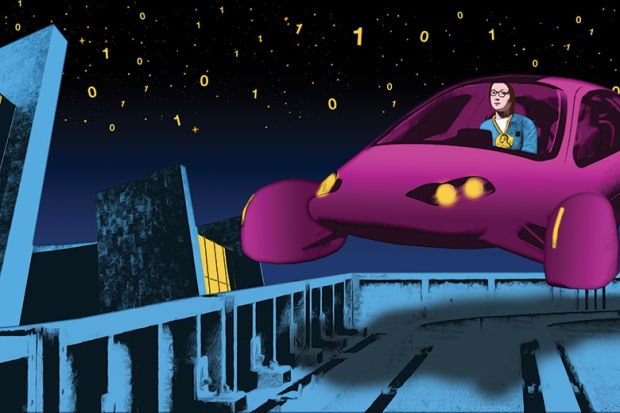The first school science project to win the Nobel Prize is a landmark not only in the history of science, but also in the history of the struggle to democratise information.
Faith Farnsorth’s “regenerative charger” made the front page of Nature “quite by accident” in 2038 after she hooked up an open-source GP9 inference engine to the H-Corpus7 database, as instructed by her teachers. By forgetting to plug in her laptop, she caused her homework program to try extending its own battery life – and so the “regenerative cell” was born. Ten years on, that innovation is estimated to have cut the global temperature rise by half a degree.
Some governments still want to ban HC7, of course. Even two decades after the Great Publisher Collapse of 2027 brought the so-called techno-feudalist era to an end, some still argue that only hugely profitable corporations with a history of opposition to open access can be trusted to preserve the fruits of humankind’s learning.
But it isn’t as if self-contained oracles hadn’t been anticipated. The famous Douglas Adams character Arthur Dent hitch-hiked around the galaxy guided by “the standard repository of all knowledge and wisdom”, a clunky 1980s personal digital assistant that more or less fitted into a manbag alongside his towel. If the techno-feudalists hadn’t had their heads buried in “The Cloud”, they would have seen its non-fictional version coming a mile off.
Historically, the strategic limitation of knowledge was always an unspoken function of government. The combination of the Licensing of the Press Act of 1662 and William Tyndale’s Bible roused a mob of “Royal Stationers” to scour Tudor Britain for printers of “seditious, treasonable and unlicensed Bookes and Pamphlets” – some of whom were burned alive on pyres of their own creations. Then there was the 1710 Statute of Anne, a masterpiece of chicanery that recast information control as “the encouragement of learning”.
In the computing era, storage capacity lagged behind processing and communication for 50 years, leading to vast, centralised databases, run by colossal corporations, that held all humankind’s data hostage by the mid-2020s. In what is now seen as the nadir of data science and a low point in scientific ethics, archaic copyright laws forced researchers and educators to pay extortionate fees to read their peers’ publicly funded writing.
The techno-feudalists had the police hunt down the pioneers of HC7, whom they dismissed as “hackers”. Alexandra Elbakyan’s Sci-Hub, now heralded as a cornerstone of HC7, was jeered by the same universities whose professors secretly used it for their research. Aaron Swartz was hounded to suicide in 2013 for downloading millions of journal articles, intending to make them freely available.
After the death of his mentor to pancreatic cancer, 15-year-old Jack Andraka – Faith Farnsorth’s spiritual father – used papers he found on the internet – some of which may have been there thanks to Swartz – to develop a reliable, cheap cancer test, for which he was awarded a major science prize in 2012.
Then came the Covid pandemic and “climate emergency”. What had been a friendly, ideological tussle about the digital rights of scientists versus profiteers took on a new tone. To call it “civil disobedience” would be to miss the point. Universities simply stopped playing the game – and the more progressive governments followed suit by deeming the enforcement of academic publishers’ copyright no longer in the public interest. Humanity grew up.
In 2021, quantum leaps in materials science made hard drives of 20TB cheaply available, and tiny 200TB devices swept the market a few years later. Another, quieter revolution of distribution also changed the world. The collective stake in information enabled by the Interplanetary File System and cryptocurrency-based distributed file systems gave incentives for reliable curation. Soon, every university and school held the entire scientific corpus on site and were part of the giant citizen science network known as the Human Corpus Canon project.
In part, the charge was led by data and machine-learning scientists who saw that science was shifting gear to solve pressing problems. Holistic processing of the entire corpus was necessary, and that corpus needed to be in a single place for more or less random access.
Many say that the disappearance of the publishers, and of data capitalism itself, was really a cultural change. The 2030s saw the emergence of mostly young “celebrity scientists”: kids in their bedrooms (and sometimes their parents), who played with the “gamified”, open-source apps based around HC7 variants that had overnight replaced popular online assistants like Siri and Alexa. Governments had to invest billions in empirical verification projects to keep up with the march of popular science.
As for Farnsorth, there is no question about the veracity of her regenerative cell. You can argue about whether the Nobel prize money should really go to her or to the coders of her homework problem, but one thing is for sure: none of this could have happened if the Royal Stationers and their descendants were still demanding their cut of science’s riches.
Andy Farnell is a visiting and associate professor in signals, systems and cybersecurity at a range of European universities. His latest book, Ethics for Hackers, will be published next year.
POSTSCRIPT:
Print headline: In 2048, information is unchained and even schoolgirls win Nobels
Register to continue
Why register?
- Registration is free and only takes a moment
- Once registered, you can read 3 articles a month
- Sign up for our newsletter
Subscribe
Or subscribe for unlimited access to:
- Unlimited access to news, views, insights & reviews
- Digital editions
- Digital access to THE’s university and college rankings analysis
Already registered or a current subscriber? Login








